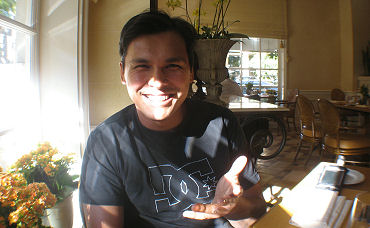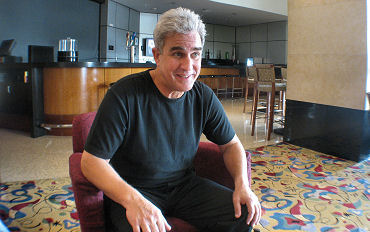By saying yesterday that I hate eating big plates of food because of the way it makes me feel, I didn’t mean to sound unthankful for a lot of things. I’d like to express thanks to the various forces — parental guidance, genetics, fate — for things having worked out for Hollywood Elsewhere as well as they have over the last couple of years. Those of us who are healthy and not too fat or (God forbid) affllicted with terrible diseases can be thankful for these things also. I’m very thankful for all the gifted people in this town and elsewhere who are making excellent films, or at least trying like hell to do so. I’m thankful for something that happened a couple of nights ago, and the idea that serene music sometimes floats down into our laps from time to time. I’m not exactly thankful that I work 14 to 16 hours per day, but on the other hand I am because at least I’m strong and healthy enough to do that. I’m extremely thankful that my laptop is still doing well (it’s three years old and therefore on borrowed time), and that I will soon have enough ad revenue to go out and get a new 17″ widescreen. I’m very thankful that terrible forces haven”t swooped down like Valkyries and destroyed my life (which has happened to thousands in Iraq and Darfur and elsewhere) — I say that knowing that bad things can happen at any time. I’m grateful for a lot of things, but I still won’t eat anything today.
wired
Goldstein on Oscar bloggers
Yesterday The Envelope columnist Patrick Goldstein wrote a toast about four Oscar bloggers — myself, Anne Thompson (Risky Biz blog), David Poland (The Hot Blog) and Tom O’Neil (Gold Derby). I’m thankful for the attention — thanks, Patrick — and especially for the following portion:

“Right now the writers who matter are the Oscar bloggers, who create the buzz studios need to keep their campaigns humming. In years past, the studios controlled the conversation, shaping campaigns with swanky ‘For your consider- ation’ ads. But the internet has changed everything. Just as Daily Kos and other liberal blogs exert a powerful gravitational pull over Democratic Party politics, the blogmeisters have become the key generators of buzz in Oscar campaign- ing.”
Thompson is the only one to receive Patrick’s full approval. He says O’Neil’s cover- age is breathless and campy, he calls Poland a know-it-all, and he zings me twice — for talking too much about clattering silverware screwing up taped interviews and (good God…not again) saying a few weeks ago that I was “very satisfied — I can even say comforted — that I was part of the team that…took down Munich.”
I swore, sighed and wrote Goldstein the following rebuttal: “By your own admission Hollywood Elsewhere has an impact of some kind. It gets into this and that topic, it gets read around town, etc I must have written…what?…six or seven anti-Munich screeds last year. I ran a photo of a ripped Munich billboard that may have done more to hurt that film’s Oscar chances than any piece of writing. And if there can be said to be a ‘team’ that helped to take down Munich — and c’mon, you know that columnists are part of the engine that drives any industry sentiment or current — why is it bad to say I was merely part of the effort?
“Not the leader, not one of the big cheeses, not Gen. Patton, not a major, not a captain, not a lieutenant…just another griping foot soldier trudging along in the ’05 mud and doing what I could to puncture the ego-collossus of Spielberg & the arrogant determinations of Time magazine. What’s so egoistic and boastful about that? If my father said, ‘I was a lieutenant fighting on Iwo Jima, and therefore I was part of the effort that defeated the Japanese on that island’…would that be seen as boastful and out-of-place?”
Payback vs. Point Blank
The harder, blunter version of Brian Helgeland‘s almost eight-year-old Payback is coming out on Paramount Home Video in March ’07, and it’ll also show at the Santa Barbara Film Festival in late January. A good guy gave me a VHS of it a few days ago; I watched some of it this morning. It’s smart and amusing in spurts, and I guess it’s an improvement of sorts…but its not much of one. I found it a little too dour. That’s one way of saying I still prefer John Boorman‘s Point Blank, the 1967 noir classic.
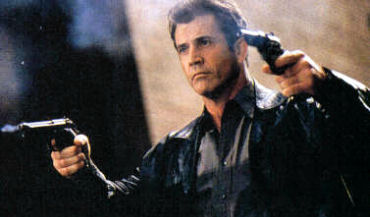
Both are based on Donald Westlake‘s “The Hunter.” Mel Gibson plays the hardball avenger in Helgeland’s version; Lee Marvin played the same guy in Point Blank . But the names…my God. Westlake’s character was called “Parker.” Marvin’s is called “Walker” — good metaphor, self-sufficient traveller, man on a journey — but Gibson’s is called “Porter.” That sounds subservient, timid…the name of an accountant.
I’ve recorded dialogue from a portion of the same scene in both films. The Point Blank version is between Lloyd Bochner‘s Carter and John Vernon‘s Mal Reese; the Payback version is between William Devane ‘s Carter and Gregg Henry‘s Val Resnick (same as Reese). Notice how much more lean and direct the Boor- man version sounds, and how tedious it feels when Henry half-jokes about not knowing Porter’s first name.
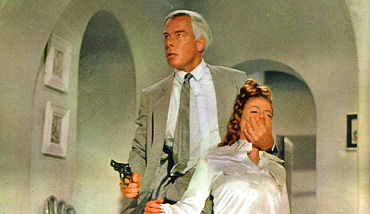
Wilson at the Beacon
It’s hard to put my finger on a simple, pared-down “why”, but this Ben Ratliff piece is one of the best-written impressions of the ongoing Pet Sounds tour — Brian Wilson and his crew stopped at NYC’s Beacon Theatre two nights ago — I’ve ever read, and I’ve read dozens over the past few years.
Moranis on loneliness
I’m fairly loaded, I have lots of stuff in my house, I’m not all that sociable, and I miss my kids so I buy more stuff to make up the difference. So says Rick Moranis in this odd jotting in yesterday’s N.Y. Times.
“Deja Vu” is a bomb
Tony Scott‘s Deja Vu is a box-office fizzle in relation to cost. Thanksgiving weekend projections put the 3-day earnings at $19,209,000 and the 5-day tally at $27,690,000. It cost a tidy amount (director Tony Scott and producer Jerry Bruckheimer don’t shoot cheap, and Denzel Washington always gets his big fat fee, and they shot on location in post-Katrina New Orleans) and the weekend totals indicate that final domestic theatrical earnings won’t exceed $60 or $70 million. Unless it does really big overseas, it’s basically a bomb .
The other 3-day and 5-day Thanksgiving projections: #1 isHappy Feet (3 day, $45,300,000 — 5-day, $63,000,000…way ahead of Casino Royale and totally cleaning up); #2 is Casino Royale (3-day, $30,741,000 — 5-day, $45,615,000… action-driven Deja Vu cut into business); #3 is Deja Vu; #4 is Borat (3-day, $15,399,000 — 5-day, $21.563,000); #5 is Santa Clause 3 (3-day, $11,455 — 5-day, $21,563,000); #6 is Deck The Halls (3-day, $10,649,000 — 5-day, $15,263,000 …tank), #7 is Tenacious D (3-day, $8,819,000 — 5-day, $12,196,000); #8 is Stranger Than Fiction (3-day, $7,457,000 — 5-day, $10,419,000); #9 is Flushed Away (3-day, $5,305,000 — 5-day is $7,296,000), and #10 is The Fountain ($3-day, $4,758,000 — 5-day, $7,736,000).
“Children” is a masterpiece
Alfonso Curaron‘s Children of Men is “another sort of fairytale altogether, one cloaked in the mystique of dystopia. It’s a film as unflinching in its bleakness as it is penetrating in its deep-seeded sentimentality. And in manifesting one of the most horrific visions of the future [that have been] yet committed to film, Cuaron has given us his masterpiece, the crowning achievement of 2006.” — Kris Tapley, In Contention.
Adam Beach’s history
Sometimes recordings don’t work out, like this one of a chat I had last Monday with Flags of Our Fathers Adam Beach at the Four Seasons hotel. Four loud guys in business suits sat down two tables away and started telling each other jokes, and I knew if we didn’t move right then and there the digital recording would be ruined. I should have suggested this to Beach, but I didn’t. I told myself those four loud guys weren’t so loud. Listen if you want, but it’s a little bit faint and echo-y at times.
Beach is being talked up for a Best Supporting Actor nomination for his performance as Iwo Jima veteran Ira Hayes, who died fairly young from alcoholism. Clint Eastwood‘s film tells you one of the reasons Hayes turned to the bottle is that he couldn’t hack the hypocrisy of the war-bond tour while his buddies were fighting and dying in the Pacific, but I think Hayes was basically a guy with a huge alchohol problem that he couldn’t stand up to. I’m sure other things bothered or confused him, but he could have somehow dealt with them if it hadn’t been for the booze.
And yet Beach is playing the Eastwood interpretation — naturally. Not the saga of a problem drinker, but a guy with too big (or too weak) a heart and an inability to struggle through and play along. It’s a dark and aching performance — Hayes is obviously the guy you feel for the most for because he’s the most emotionally frail and upset. Clearly, Beach knows a thing or two about bitterness and cynicism. There’s authenticity in the hurt.
But about 40 minutes into our chat, Beach told me something fairly startling: when he was eight years old in 1980 and living in Manitoba, Canada, his mother was killed in a hit-and-run accident, by a car driven by a Native American who was drunk. (The guy was never really punished for what he did, Beach told me.) And then two months later Adam’s father, deeply distraught over his wife’s death and having turned to alcohol to anesthetize the pain, died also — an apparent case of suicide, or something close to that.
Here’s a guy, I said to myself, whose childhood life was shaken and ripped apart by two alchohol-related deaths, and then at age 33 he’s hired to play a guy whose life ended due to an alcohol problem — that’s pretty synergistic. On top of which is the compounded irony of he and Eastwood saying in interviews (as the movie says) that Hayes’ problem wasn’t about booze per se as much as Hayes being too emotionally susceptible and being unable to be a good p.r. guy or pretend to be something other than what he was.
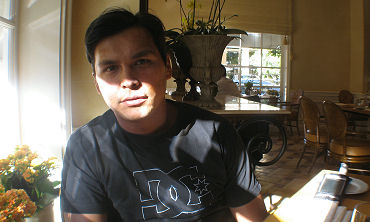
Monday, 11.20.06, 1:27 pm
With Beach’s permission (and with Clint’s), I prefer the alcohol angle. It’s obviously more personal for Beach — disturbingly personal — and it ties in with the common belief that Hayes would never died and might have even had a shot at a half-decent life if it hadn’t been for the bottle.
All I know is, I’ve had a different view of Beach and his Flags performance since speaking to him three days ago. In hindsight, I think what he did was pretty remarkable. Fairly courageous, in fact.
O’Neil on HFPA Noms
The Hollywood Foreign Press Association is right, of course — Leonardo DiCaprio and Matt Damon‘s performances in The Departed are leads and not supporting. And yet Warner Bros. marketers have tried to separate Leo’s undercover-cop performance in the Martin Scorsese drama with a proposed Best Supporting Actor nomination so it won’t compete with his South African diamond-smuggler performance in Blood Diamond, which WB has put up for Best Actor.
The Envelope’s Tom O’Neil reported the HFPA divergence fomr the Warner Bros. line earlier today.
Warner Bros. has pushed these DiCaprio perfs in their respective categories in “For Your Consideration” ads appearing in Variety and The Hollywood Reporter.
Kudos campaigners don’t want Leo to compete against his obvious lead part in Blood Diamond and Matt to clash with his starring role in The Good Shepherd, but now a Leo vs. Leo vs. Matt vs. Matt smackdown is inevitable.” Okay, awkward too bad….but Leo for Best Actor in The Departed is correct .
“Some other eligibility decrees were also surprising,” O’Neil reports. “As is awards protocol with children regardless of the size of their role, Fox Searchlight is campaigning 10-year-old Abigail Breslin (Little Miss Sunshine) in the supporting slot, but HFPA put her in lead.” What? I take it back — the HFPA-ers are morons.
“Flags of Our Fathers FYC ads cite Ryan Phillippe as lead actor and costars Adam Beach and Jesse Bradford as supporting, but the Globes salute all three soldiers as lead” — more idiocy.
Cary Grant vs. Nancy Meyers
Fantasy — the kind geared to the women who read Cosmopolitan — is a very fundamental aesthetic in any Nancy Meyers film. Not just girly-girl fantasy, but historical fantasy as well. Case in point: a line in Meyers’ new film The Holiday (Columbia, 12.8) declares that Cary Grant came from or had roots in the London suburb of Surrey. The problem is that it ain’t so. I could be half-wrong and Grant may have lived in Surrey at one point, but I doubt it…and if I’m right, why would Meyers fabricate something about a famous actor’s life?
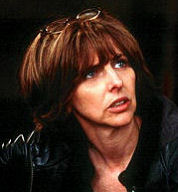

Nancy Meyers (l.); Cary Grant (r.)
Grant was born in Bristol, England in 1904 and, according to biographers Marc Elliot, Charles Higham and Roy Moseley as well as his Wikipedia bio and an extensive web search I did this morning, never owned or rented a home in Surrey, much less “came from” there . He came from modest circumstances — Surrey is a nicely-moneyed bedroom community. Grant travelled to the U.S. with the Bob Pender troupe in 1920, and within a couple of years he was living in New York permanently. By 1930 or so, he’d moved to Los Angeles to try and brreak into movies.
It’s possible, of course, that Grant may have rented a Surrey home at some point and I just couldn’t find a mention of it. (I called Meyers’ office at Sony and asked an assistant to please pass along the inquiry, and of course a reply never came back — a contact at Sony publicity declined to return also.) But even if Grant stayed in Surrey for a brief period, that wouldn’t make him “from” there, which is what Kate Winslet’s character (a lovesick London journalist on holiday in Los Angeles) essentially says when she’s speaking to Eli Wallach‘s aging screenwriter character.
Winslet lives in a cute little home in Surrey — totally fake-looking in a Nancy Meyers way…a gingerbread, storybook house that’s been interior-decorated within an inch of its life, at the real-world cost of God knows how many tens of thousands of dollars, if not pounds. To get away from a rake (Rufus Sewell) she’s in love with, she swaps homes with a successful movie-trailer cutter (Cameron Diaz) , who’s also reeling from a soured relationship and looking to blow town.
If anyone knows of any substantial Cary Grant-Surrey connection, please advise.
Sounds of punches
It’s strange, but there’s a bizarre scene in Nancy Meyers‘ The Holiday when Cameron Diaz punches her soon-to-be ex-boyfriend (played by Ed Burns) that almost works, and the same bit is shown in the Holiday trailer and it doesn’t work at all. The reason is that the sound of the punch is different in the feature (i.e., fake but not blatantly so) than in the trailer.
When Cameron decks Burns in the film, it sounds half-realistic in a typical bogus way — you hear that combination “thunk-kish” sound that foley techicians have been fond of for the last 50 or 60 years. But when she slugs him in the trailer, it sounds like ten Rocky Balboas slugging ten slabs of raw meat simultan- eously in a Philadelphia butcher shop, only amplified and turned up to 10.
What does this mean? That trailers are about the bullshit “sell” (even if hearing a ridiculously over-amped punch sends some of us running in the opposite direction) and are about their own jackoff standards and maneuvers, and movies are about trying to adhere to a kind of movie reality that’s supposed to be at least somewhat acquainted with the way people actually behave and the way things actually sound. Even if the film has been directed by Nancy Meyers.
The Great Ben Sliney
For months I’ve been feeling that former FAA bigwig Ben Sliney, who plays himself in Paul Greengrass‘s United 93, should be regarded as a Best Supporting Actor contender. It’s a minority opinion, okay, but New York Post critic Lou Lumenick is an ally. And there’s a lot more merit to this suggestion than you might think at first.
Sliney does a lot more in this superb film than play himself, and he does more than just “behave.” He exudes a mixed-bag thing that boils down to three quan- tities — trust, concentration and plain-spokenness. A Boston-area native and a former Manhattan attorney who lives in Long Island (about a half hour out of town), Sliney sends out decency signals like a radio tower — a certain can-do affable- ness. He’s Joe Pesci without the manic edge. He’s Jack Warden in the ’70s and ’80s, only less actor-ish. He’s James Gleason. (Very few readers know who Gleason was, I’m guessing, but he was the boxing manager in ’41’s Here Comes Mr. Jordan.)
Sliney is a soother character. As soon as he appeared in United 93 and started talking, I said to myself, “I like this guy…he’s part white-collar, part blue-collar.” A lot of actors know how to summon the skill to project this quality, but very few seem to be actually be it. Sliney’s United 93 performance is a little like Harold Russell‘s in The Best Years of Our Lives, only he seems smarter and more confident.
I met hundreds of meat-and-potato guys like Ben Sliney when I lived in Manhattan in the early ’80s, and there ought to be more of them in movies.. Because they’re life-like in a familiar, vaguely comforting sort of way. And you can’t beat that last name. “Sliney” is the kind of name would-be actors always drop when they decide to try to get into the business. It’s a name like “Smucker.” Worse, actually.
I just saw Nancy Meyers‘ The Holiday the other night, and it’s all about big stars putting on acts that you don’t believe. (Jack Black is the only genuine presence among the four leads — Eli Wallach and Ed Burns are very good in supporting roles.) Ben Sliney may not be an “actor,” but he projects more humanity, warmth and natural charm in United 93 than Cameron Diaz, Jude Law and Kate Wins- let do in Meyers’ film.

Another guy Sliney reminds me of is marketing guy Tom Sherak, who used to be a vice-chairman at 20th Century Fox and then a top dog at Revolution Studios. Sherak spoke before a class that I moderated back in the mid ’90s, and people liked him right away for the same reasons. Because he talks like a working-class guy and doesn’t put on airs, but at the same time is obviously brilliant and shrewd and a gentleman.
I spoke to Sliney late this morning in the lobby of the Rennaissance Hotel. We began by talking about computers and how he learned to “act” as a trial lawyer. I don’t have to summarize our chat — it’s all there. Here’s the mp3.
Message to agents: this guy really has something and is jazzed enough by his United 93 experience to maybe act again. Message to Academy: in his own unforced, unassuming way, Sliney is just as good in his film as Adam Beach is in Flags of Our Fathers , Jack Nicholson in The Departed, Brad Pitt in Babel and and Steve Carell and Alan Arkin in Little Miss Sunshine.
And he’s better than Eddie Murphy in Dreamgirls because he has more of a lived-in quality than Murphy (who “acts” all through it) and because he never drops his pants.

